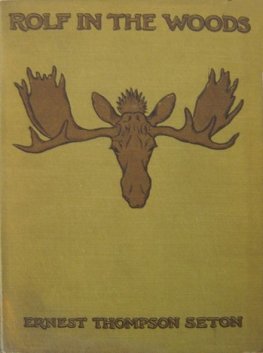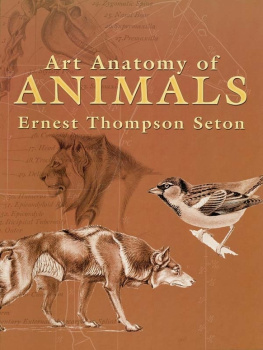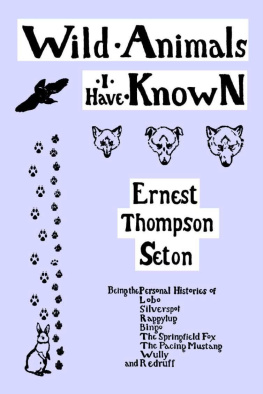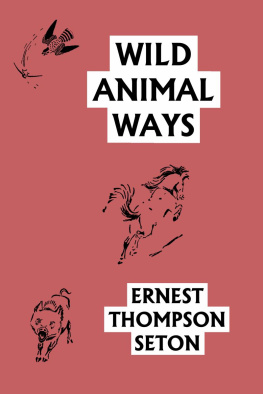Ernest Seton - Rolf in the Woods
Here you can read online Ernest Seton - Rolf in the Woods full text of the book (entire story) in english for free. Download pdf and epub, get meaning, cover and reviews about this ebook. genre: Children. Description of the work, (preface) as well as reviews are available. Best literature library LitArk.com created for fans of good reading and offers a wide selection of genres:
Romance novel
Science fiction
Adventure
Detective
Science
History
Home and family
Prose
Art
Politics
Computer
Non-fiction
Religion
Business
Children
Humor
Choose a favorite category and find really read worthwhile books. Enjoy immersion in the world of imagination, feel the emotions of the characters or learn something new for yourself, make an fascinating discovery.
- Book:Rolf in the Woods
- Author:
- Genre:
- Rating:5 / 5
- Favourites:Add to favourites
- Your mark:
- 100
- 1
- 2
- 3
- 4
- 5
Rolf in the Woods: summary, description and annotation
We offer to read an annotation, description, summary or preface (depends on what the author of the book "Rolf in the Woods" wrote himself). If you haven't found the necessary information about the book — write in the comments, we will try to find it.
Rolf in the Woods — read online for free the complete book (whole text) full work
Below is the text of the book, divided by pages. System saving the place of the last page read, allows you to conveniently read the book "Rolf in the Woods" online for free, without having to search again every time where you left off. Put a bookmark, and you can go to the page where you finished reading at any time.
Font size:
Interval:
Bookmark:
version="1.0" encoding="utf-8"?>child_advErnestThompsonSetonRolf in the Woods
The Adventures of a Boy Scout with Indian Quonab and Little Dog Skookum.
Attention!!! Chapter 7 is missed
1911 enenLT NemoFictionBook Editor Release 2.609.06.2011www.gutenberg.orgProduced by Anonymous Volunteers, Ted Soldan, and David Widger4F180596-2413-47CB-A703-0BB79DA692481.0
enenLT NemoFictionBook Editor Release 2.609.06.2011www.gutenberg.orgProduced by Anonymous Volunteers, Ted Soldan, and David Widger4F180596-2413-47CB-A703-0BB79DA692481.0
Rolf in the Woods
By Ernest Thompson Seton
Preface
In this story I have endeavoured to realize some of the influences that surrounded the youth of America a hundred years ago, and made of them, first, good citizens, and, later, in the day of peril, heroes that won the battles of Lake Erie, Plattsburg, and New Orleans, and the great sea fights of Porter, Bainbridge, Decatur, Lawrence, Perry, and MacDonough.
I have especially dwelt in detail on the woodland and peace scouting in the hope that I may thus help other boys to follow the hard-climbing trail that leads to the higher uplands.
For the historical events of 181214, I have consulted among books chiefly, Theodore Roosevelts Naval War of 1812, Peter S. Palmers History of Lake Champlain, and Walter Hill Crocketts A History of Lake Champlain, 1909. But I found another and more personal mine of information. Through the kindness of my friend, Edmund Seymour, a native of the Champlain region, now a resident of New York, I went over all the historical ground with several unpublished manuscripts for guides, and heard from the children of the sturdy frontiersmen new tales of the war; and in getting more light and vivid personal memories, I was glad, indeed, to realize that not only were there valour and heroism on both sides, but also gentleness and courtesy. Histories written by either party at the time should be laid aside. They breathe the rancourous hate of the writers of the age the fighters felt not so and the many incidents given here of chivalry and consideration were actual happenings, related to me by the descendants of those who experienced them; and all assure me that these were a true reflex of the feelings of the day.
I am much indebted to Miss Katherine Palmer, of Plattsburg, for kindly allowing me to see the unpublished manuscript memoir of her grandfather, Peter Sailly, who was Collector of the Port of Plattsburg at the time of the war.
Another purpose in this story was to picture the real Indian with his message for good or for evil.
Those who know nothing of the race will scoff and say they never heard of such a thing as a singing and religious red man. Those who know him well will say, Yes, but you have given to your eastern Indian songs and ceremonies which belong to the western tribes, and which are of different epochs. To the latter I reply:
You know that the western Indians sang and prayed in this way. How do you know that the eastern ones did not? We have no records, except those by critics, savagely hostile, and contemptuous of all religious observances but their own. The Ghost Dance Song belonged to a much more recent time, no doubt, but it was purely Indian, and it is generally admitted that the races of continental North America were of one stock, and had no fundamentally different customs or modes of thought.
The Sunrise Song was given me by Frederick R. Burton, author of American Primitive Music. It is still in use among the Ojibwa.
The songs of the Wabanaki may be read in C. G. Lelands Kuloskap the Master.
The Ghost Dance Song was furnished by Alice C. Fletcher, whose Indian Song and Story will prove a revelation to those who wish to follow further.
Ernest Thompson Seton.
Chapter 1. The Wigwam Under the Rock
The early springtime sunrise was near at hand as Quonab, the last of the Myanos Sinawa, stepped from his sheltered wigwam under the cliff that borders the Asamuk easterly, and, mounting to the lofty brow of the great rock that is its highest pinnacle, he stood in silence, awaiting the first ray of the sun over the sea water that stretches between Connecticut and Seawanaky.
His silent prayer to the Great Spirit was ended as a golden beam shot from a long, low cloud-bank over the sea, and Quonab sang a weird Indian song for the rising sun, an invocation to the Day God:
O thou that risest from the low cloud
To burn in the all above;
I greet thee! I adore thee!
Again and again he sang to the tumming of a small tom-tom, till the great refulgent one had cleared the cloud, and the red miracle of the sunrise was complete. Back to his wigwam went the red man, down to his home tucked dosed under the sheltering rock, and, after washing his hands in a basswood bowl, began to prepare his simple meal.
A tin-lined copper pot hanging over the fire was partly filled with water; then, when it was boiling, some samp or powdered corn and some clams were stirred in. While these were cooking, he took his smooth-bore flint-lock, crawled gently over the ridge that screened his wigwam from the northwest wind, and peered with hawk-like eyes across the broad sheet of water that, held by a high beaver-dam, filled the little valley of Asamuk Brook.
The winter ice was still on the pond, but in all the warming shallows there was open water, on which were likely to be ducks. None were to be seen, but by the edge of the ice was a round object which, although so far away, he knew at a glance for a muskrat.
By crawling around the pond, the Indian could easily have come within shot, but he returned at once to his wigwam, where he exchanged his gun for the weapons of his fathers, a bow and arrows, and a long fish-line. A short, quick stalk, and the muskrat, still eating a flagroot, was within thirty feet. The fish-line was coiled on the ground and then attached to an arrow, the bow bent zip the arrow picked up the line, coil after coil, and trans-fixed the muskrat. Splash! and the animal was gone under the ice.
But the cord was in the hands of the hunter; a little gentle pulling and the rat came to view, to be despatched with a stick and secured. Had he shot it with a gun, it had surely been lost.
He returned to his camp, ate his frugal breakfast, and fed a small, wolfish-looking yellow dog that was tied in the lodge.
He skinned the muskrat carefully, first cutting a slit across the rear and then turning the skin back like a glove, till it was off to the snout; a bent stick thrust into this held it stretched, till in a day, it was dry and ready for market. The body, carefully cleaned, he hung in the shade to furnish another meal.
As he worked, there were sounds of trampling in the woods, and presently a tall, rough-looking man, with a red nose and a curling white moustache, came striding through brush and leaves. He stopped when he saw the Indian, stared contemptuously at the quarry of the morning chase, made a scornful remark about rat-eater, and went on toward the wigwam, probably to peer in, but the Indians slow, clear, keep away! changed his plan. He grumbled something about copper-coloured tramp, and started away in the direction of the nearest farmhouse.
Chapter 2. Rolf Kittering and the Soldier Uncle
A feller that chatters all the time is bound to talk a certain amount of drivel.
The Sayings of Si SylvanneThis was the Crow Moon, the white mans March. The Grass Moon was at hand, and already the arrow bands of black-necked honkers were passing northward from the coast, sending down as they flew the glad tidings that the Hunger Moon was gone, that spring was come, yea, even now was in the land. And the flicker clucked from a high, dry bough, the spotted woodwale drummed on his chosen branch, the partridge drummed in the pine woods, and in the sky the wild ducks, winging, drummed their way. What wonder that the soul of the Indian should seek expression in the drum and the drum song of his race?
Next pageFont size:
Interval:
Bookmark:
Similar books «Rolf in the Woods»
Look at similar books to Rolf in the Woods. We have selected literature similar in name and meaning in the hope of providing readers with more options to find new, interesting, not yet read works.
Discussion, reviews of the book Rolf in the Woods and just readers' own opinions. Leave your comments, write what you think about the work, its meaning or the main characters. Specify what exactly you liked and what you didn't like, and why you think so.





